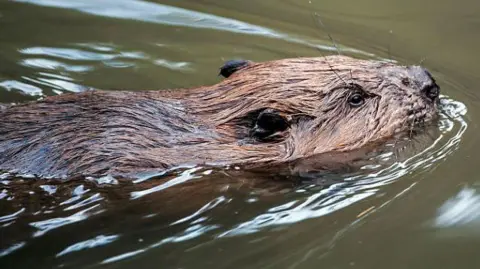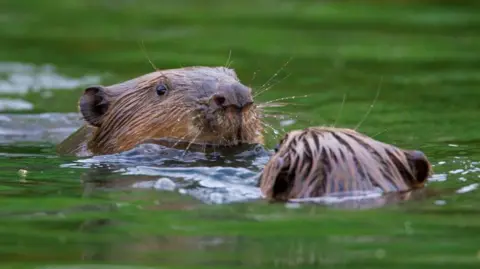Licence approved for beavers in UK's biggest park
 Getty Images
Getty ImagesSix beaver families are set to be released at sites in the UK's biggest national park.
Scotland's nature body, NatureScot, has approved a licence application for the project in the Cairngorms National Park.
The park authority, RSPB Scotland and landowners Rothiemurchus Estate and Wildland Cairngorms are involved in the proposed release.
But some farmers have raised concerns about the beavers damaging crops and agricultural land.
NatureScot said sites in the upper River Spey catchment had been selected for beavers.
It said the decision would help increase the current range of beavers in Scotland, as set out as a priority in Scotland's Beaver Strategy 2022-2045.
The approval also allows for future additional releases at other sites over the next five years up to a total of 15 beaver families.
The decision represents the fifth catchment to which beavers have either been officially granted permission to remain, or have been released.
Populations are already established in Tayside, on the Forth, in Knapdale and Loch Lomond.
'Potential conflicts'
Donald Fraser, NatureScot head of wildlife management, said the latest licence involved one of Scotland's largest river catchments.
He added: “We also appreciate and understand both the support and legitimate concerns articulated by farmers and crofters through the consultation process.
"We are satisfied that the monitoring and mitigation plans set out by the Cairngorms National Park Authority, alongside our existing Beaver Mitigation Scheme, will sufficiently address any potential conflicts that may arise.”
Three sites have been chosen:
- Rothiemurchus Estate, near Aviemore
- RSPB Scotland's Insh Marshes, near Kingussie
- Land managed by Wildland Cairngorms - a company owned by billionaires Anne and Anders Holch Povlsens
The sites are within the catchment of the River Spey between Kingussie and Aviemore.
The beavers would be relocated from around the River Tay, specifically from areas where they are seen as a pest because of the damage they have done to farmland.
Beavers would be given a health check before being released in the Cairngorms.
Cairngorms National Park Authority has welcomed the decision.
 Getty Images
Getty ImagesMeanwhile, views are divided over any future potential release of beavers on another Highland river system, according to a public consultation.
NatureScot sought comments on the reintroduction of the animals to the River Beauly catchment.
The consultation received 12 responses, and NatureScot said opinion was split with local individuals and groups opposed to beavers returning.
Among concerns raised were damage to agricultural land and negative impacts on areas where fish spawn.
Alleviate flooding
Beavers died out in Scotland about 400 years ago but were reintroduced to Scotland in 2009.
Conservation organisations say beaver activity can improve water quality and natural habitats and also help to alleviate flooding.
Following the Beauly consultation, NatureScot said further engagement was needed with fishing groups.
It also said plans for monitoring beavers and actions to tackle problems the animals might cause needed to be developed.
A river's catchment is the area it drains.
The Beauly catchment covers about 386 sq miles (1,000 sq km) and is the second largest north of the Great Glen - which is home to Loch Ness - according to Ness and Beauly Fisheries Trust.
